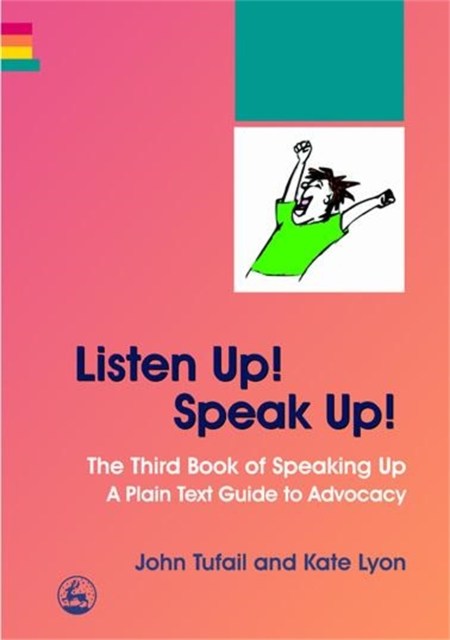I think all self-advocates should have a copy of this book to bring along to meetings to help them get more out of them.’
– The Frontline of Learning Disability
‘The Four Books in this series; ‘Introducing Advocacy’, ‘Rules and Standards’, ‘Listen Up!’ and ‘Advocacy in Action’ are comprehensive, informative and quite simply a very good introduction for someone new to the world of advocacy.’
– Practice Links in Social Work
Advocacy for people with disabilities is widely practised, but what about self-advocacy? How often do parents or carers speak ‘for’ you and prevent you being heard? Do you know your rights within advocacy law? The four books in the Speaking Up set were conceived and written specifically to promote self-advocacy to disabled individuals who want to learn how to speak up for themselves.
This third book in the series uses examples of advocacy to explore how to be a good advocate, emphasising the importance of listening to and working with an advocacy partner and explaining how to prepare for and behave in meetings.
All four books are illustrated throughout with colour drawings and case studies showing the positive results of self-advocacy on the individuals themselves, as well as on their families and carers.
This empowering training package encourages an equal partnership between the advocate and the user where the shared goal is to develop the life skills of the individual with learning difficulties. It is accessible to people with a wide range of literacy needs, including those with high learning needs and is designed for use in formal and informal learning situations, either unsupported or with a facilitator present.
– The Frontline of Learning Disability
‘The Four Books in this series; ‘Introducing Advocacy’, ‘Rules and Standards’, ‘Listen Up!’ and ‘Advocacy in Action’ are comprehensive, informative and quite simply a very good introduction for someone new to the world of advocacy.’
– Practice Links in Social Work
Advocacy for people with disabilities is widely practised, but what about self-advocacy? How often do parents or carers speak ‘for’ you and prevent you being heard? Do you know your rights within advocacy law? The four books in the Speaking Up set were conceived and written specifically to promote self-advocacy to disabled individuals who want to learn how to speak up for themselves.
This third book in the series uses examples of advocacy to explore how to be a good advocate, emphasising the importance of listening to and working with an advocacy partner and explaining how to prepare for and behave in meetings.
All four books are illustrated throughout with colour drawings and case studies showing the positive results of self-advocacy on the individuals themselves, as well as on their families and carers.
This empowering training package encourages an equal partnership between the advocate and the user where the shared goal is to develop the life skills of the individual with learning difficulties. It is accessible to people with a wide range of literacy needs, including those with high learning needs and is designed for use in formal and informal learning situations, either unsupported or with a facilitator present.
Newsletter Signup
By clicking ‘Sign Up,’ I acknowledge that I have read and agree to Hachette Book Group’s Privacy Policy and Terms of Use
Reviews
This third title in a four-volume advocacy training set continues explaining relations and practices between people with disabilities and their advocacy partners, explaining basic advocacy skills including involved listening and teamwork. This gives a case study and background information on developing listening skills and understanding others' points of view. One particularly useful section explains how to behave in meetings, a skill people with disabilities and their advocates can use to their advantage to get things accomplished.
